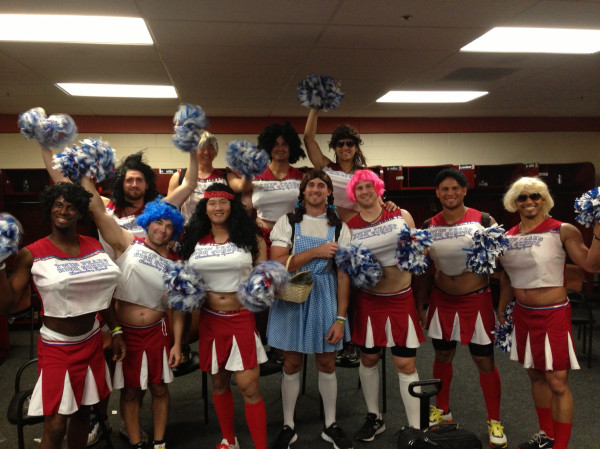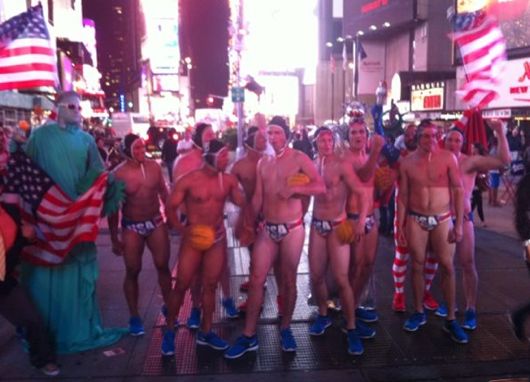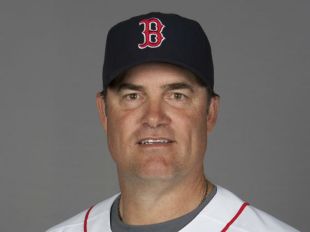MLB Rookie Hazing Sends Wrong Message to Kids
Posted by Boston Musings
As the Boston Red Sox were quietly being swept (again) by the Baltimore Orioles on Sunday, dropping their 90th game of this miserable season — the Red Sox last lost 90 games in 1966, which means (barely) that I have never seen a worse Red Sox season in my life — most eyes were on the Patriots’ convincing come-from-behind victory over the Buffalo Bills.
I happened to be checking out some tweets on Tweetdeck when I saw one come across from Gordon Edes of ESPN Boston, who retweeted a post by the official Twitter account of the Red Sox:

Presenting the 2012 #RedSox Rookies! Team tradition rookie hazing for last road trip. (Red Sox Twitter feed)
Besides the smiling rookies dressed as busty cheerleaders, along with Will Middlebrooks in the role of Dorothy from “The Wizard of Oz,” the first thing I noticed was the official tweet of the Red Sox actually used the term “hazing” in its caption.
Last week was National Hazing Prevention Week, according to the organization HazingPrevention.org. On Thursday, Dedham Police charged four students as a result of an alleged hazing incident on the high school’s football team.
So while states, including Massachusetts, have tough laws to combat hazing, it is OK, and even celebrated, in professional sports?
I replied to Edes’ tweet with “Appropriate to promote hazing?” He responded “That’s a very legit Q.”
First, the hazing is not unique to the Red Sox. Across Major League Baseball, expanded September rosters bring up rookies, and many teams have similar “traditions,” including the Tampa Bay Rays, Atlanta Braves and Miami Marlins, just to name a few.
The popular website Bleacher Report wrote the following in describing some of the hazing:
Rookie hazing can be quite the beautiful disaster.
Two more MLB teams unveiled what they did to a few rookies, and it was a complete mess.
Granted, this mess is a necessary and hilarious one to pass onto the next wave of baseball professionals as a reminder of the trials and tribulations that all have to suffer through.
So what is “hazing”? The organization StopHazing.org defines it as any activity expected of someone joining a group (or to maintain full status in a group) that humiliates, degrades or risks emotional and/or physical harm, regardless of the person’s willingness to participate.
The organization said “In years past, hazing practices were considered harmless pranks or comical antics associated with young men in college fraternities. Today we know that hazing extends far beyond college fraternities and is experienced by boys/men and girls/women in school groups, university organizations, athletic teams, the military, and other social and professional organizations. Hazing is a complex social problem that is shaped by power dynamics operating in a group and/or organization and within a particular cultural context.”
Hazing can take on many forms, and there have been plenty of examples in Greater Boston, including last week’s alleged case in Dedham.
In April, 14 men were charged with 70 criminal complaints in an alleged hazing incident at an off-campus fraternity at Boston University. In March, a BU sorority was suspended over hazing allegations.
In 2011, two Andover High School players were expelled and five were suspended for pressuring underclassmen to play “wet biscuit,” where the loser was forced to eat a cookie covered with a bodily fluid.
Hazing can turn deadly as well.
In Florida in 2011, thirteen students from Florida Agricultural and Mechanical University attacked 23-year-old drum major Robert Champion on a bus after a marching band performance, beating him to death. Since the 2011 death, a series of reports of abuse and hazing within the band have been documented. In May of 2012, two faculty members resigned in connection with a hazing investigation and 13 people were charged with felony or misdemeanor hazing crimes. Eleven of those individuals face one count of third-degree felony hazing resulting in death, which is punishable by up to six years in prison. The FAMU incident prompted Florida Governor Rick Scott to order all state universities to examine their hazing and harassment policies in December. Scott also asked all university presidents to remind their students, faculty and staff “how detrimental hazing can be.”
StopHazing.org divides hazing into three categories: subtle, harassment and violent. It equates asking new members of a group to wear embarrassing or humiliating attire, such as the rookies on the Red Sox, who had to wear the clothing on the train for the team’s trip from Baltimore to New York, as harassment hazing.
While there are obvious differences between a guy wearing a dress, violent and sexual acts and forcing someone to consume high quantities of food or alcohol, is one really “better” than another? Why are these “traditions” celebrated on the professional level?
Most of the comments I have seen on these pictures and videos have been dismissive. “LOL” and “At least they’re having fun” were the norm. One person commented on the Boston.com post of the Red Sox picture saying it was “demeaning to women.” Another said “It sends the wrong message” to kids.
As part of the “annual rookie hazing tradition,” the Rays rookies performed a choreographed rendition of Carly Rae Jepsen‘s hit Call Me, Maybe in front of the Green Monster at Fenway Park. The video went viral.
A little more high-profile, the Miami Marlins made their rookies don Speedos last Thursday and dress as the U.S. men’s water polo team. Not only that, they had to march through Times Square.

Miami Marlins rookies parade through Times Square dressed as the U.S. men’s water polo team as part of “rookie hazing.” (Twitter photo by Giancarlo Stanton)
I would find it unusual if at least one player didn’t feel embarrassed or humiliated having to wear a Speedo in Times Square or dressing in drag for a ride on the rails. And that’s what the idea of hazing is about.
Does it sometimes cross the line? Yes. Consider this hazing video with some New York Giants throwing Prince Amukamara into a tub of cold water (warning: NSFW). If Amukamara really wanted to, he could possibly file charges. Giants players insist they were not engaging in hazing.
Many schools and organizations these days have zero-tolerance policies about hazing, weapons and other rules. While I am not a fan of zero-tolerance policies — because it provides zero-common sense latitude in different situations — what kind of message does this send when the pro sports celebrate their hazing as a “team tradition?”
Let’s suppose a high school chess team tried to do the same thing and made their rookies dress in drag, because they saw a viral YouTube video of the Rays. With zero-tolerance policies, those students could face suspensions or even expulsions.
Perhaps its time that the professional teams end this practice. While it may be good for a haha laugh for some, maybe the rookies could instead film a public service announcement regarding the dangers and illegality of hazing. After all, they’re the ones getting paid to play a kid’s game.
Related articles
- Tampa Rays Rookie Hazing To ‘Call Me Maybe’ [VIDEO] (bustedcoverage.com)
- Police unable to verify FAMU hazing complaint (miamiherald.com)
- Tigers Rookie Hazing Includes Dallas Cowboys Cheerleader Costumes [PHOTOS] (bustedcoverage.com)
- National hazing prevention week ends (digitalbullpen.com)
- You: Prince Amukamara a Victim of Hazing from Jason Pierre-Paul and Giants Teammates (bleacherreport.com)
- Florida A&M: Victim Was Responsible for Hazing Death (insidehighered.com)
- University of Iowa frat shut down after alleged hazing (qctimes.com)
- Locker room culture no excuse for hazing (hamptonroads.com)
- Dedham Police Investigate Alleged Football Team Hazing (boston.cbslocal.com)
- FAMU suspends dance team after hazing reports (cnsnews.com)
About Boston Musings
I'm a Boston native who took a 15-year hiatus in the Arizona desert, only to return to a place where I truly feel at home. I have interests in sports, weather, travel, public transportation, music, and the outdoors. Fenway Park is my cathedral, and I fondly remember the days of the Big Bad Bruins.Posted on October 1, 2012, in Red Sox and tagged baseball, bullying, busty cheerleaders, gordon edes, hazing, miami marlins, new york giants, Red Sox, sports, tampa bay rays, wrong message. Bookmark the permalink. 1 Comment.

I actually called MLB about this after I saw a clip of the Rays’ rookies dancing on the field at Fenway. I was transferred to some woman who insisted that the players want to participate. She just plain wasn’t getting what I was trying to say. I also emailed the MA attorney general’s office. Hazing is illegal in MA. As far as I know, there are no exceptions for major leaguers. I think charges ought to be filed and that the punishment should include public address spots by rookies saying that hazing is illegal and it is okay to say no to hazing rituals.
Thanks for your thoughts on this. I was beginning to think I was the only one who was seeing a mixed message in all of this.